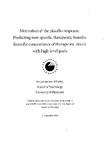Motivation and the placebo response : predicting non-specific therapeutic benefits from the concordance of therapeutic rituals with high-level goals
| dc.contributor.author | Whalley, Benjamin Jon | |
| dc.contributor.other | School of Psychology | en_US |
| dc.date.accessioned | 2011-06-28T14:15:30Z | |
| dc.date.available | 2011-06-28T14:15:30Z | |
| dc.date.issued | 2008 | |
| dc.identifier | Not available | en_US |
| dc.identifier.uri | http://hdl.handle.net/10026.1/504 | |
| dc.description.abstract |
Predicting individual differences in placebo responding has proved hard. Predictions from dispositional or personality variables are unreliable for two reasons: first, because dispositional predictions fail to account for situational variability, and second, because the dimensions identified in popular dispositional models are inter-individual variables, and may not map on to intra-individual structures and processes involved in placebo effects. This thesis describes a new psychological mechanism of placebo responding—motivational concordance—which links placebos with established research on human values and goal-striving. Progress towards goals, particularly goals which are self-actualising, is associated with positive emotional states. Findings presented here support the view that when ritualised behaviour associated with taking a placebo substance is concordant with high-level or self-defining goals then participants experience therapeutic benefits. Thus, goals represent enduring dispositions which may interact with features of the situation in predictable ways to produce placebo responses. This motivational account avoid a number of problems associated with alternative expectancy-based accounts, in particular the proximal causes of placebo responses in complex situations. This report presents data that support the motivational concordance account in a number of ways: Placebo responding is found to be temporally consistent but contextually specific; people respond to a placebo consistently, but only when contextual features of its presentation are held constant (Chapter 2). Motivational dispositions predict responses to a complementary therapy, replicating an earlier finding (Chapter 3). Trait predictions are found to be moderated by the motivational context of the placebo ritual (Chapter 5). Chapter 6 demonstrates that motivational-affective benefits of placebos can occur 'at one remove'; temper tantrums in young children were reduced when carers performed a motivationally-concordant placebo ritual. Finally, data from Chapter 7 suggest that motivational concordance may generalise to traits other than spirituality, and to other treatments including conventional medical therapies. | |
| dc.language.iso | en | en_US |
| dc.publisher | University of Plymouth | en_US |
| dc.title | Motivation and the placebo response : predicting non-specific therapeutic benefits from the concordance of therapeutic rituals with high-level goals | en_US |
| dc.type | Thesis | |
| dc.identifier.doi | http://dx.doi.org/10.24382/3379 | |
| dc.identifier.doi | http://dx.doi.org/10.24382/3379 |
Files in this item
This item appears in the following Collection(s)
-
01 Research Theses Main Collection
Research Theses Main


